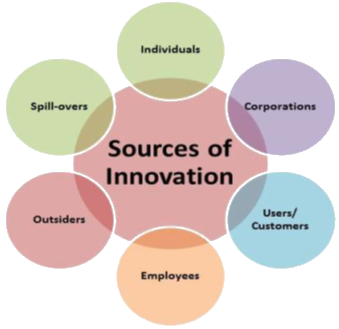Centre for Innovation
The Centre for Innovation aims to inculcate a spirit of
innovation and foster a culture of excellence and perfection among all the
stakeholders at K L Deemed to be University.
It aims at making the campus a storehouse of ideas where
all the processes are undertaken in the best manner which brings out maximum
benefits to every individual on campus and the society. The Centre functions as
a nodal agency which promotes ideation and innovation in each and every possible
sphere of lives in the campus. CFI is a part of the Innovation, Incubation and
Entrepreneurship (IIE) and, works in collaboration with centre of incubation and
Entrepreneurship.
Innovation Process:
Ideas may be spontaneous or directed. Ideas will be short
listed through following stages:
Phase I:
Ideas fest will be conducted like start-up weekend where students of K L Deemed to be University or
other college students will participate and present their ideas in presence of
the internal and external experts. Some ideas will be short listed and
finalized
Phase II: The
CFI forwards these ideas to a team of experts for further analysis and
discussion at a level that is one step closer towards implementation. This is
done in collaboration with industry experts who test the idea in real world
environments.
Phase III: This
is the stage where one has to turn the idea into a solid written proposal and
submit for financial support for implementation
Main components of CFI are:
- Student’s innovation team
- Faculty innovation team
- Alumni innovation team
Benefits of innovation
- Improve product quality
- Learn about new technology
- Reduce production cost
- Reduce labour costs
- Open up new markets
- Reduce energy consumption
- Reduce environment effects
- Improve working conditions
Research is a
measure of innovation
Create and maintain a world class university will
need to develop a culture of innovation in the university.
Innovation requires nothing short of a paradigm
shift in the established ways of thinking about university education. It
calls for Redefinition of knowledge and its purpose, Reorganization of branches
of knowledge, Rethinking the existing practices of teaching-learning and
research and Recognition of the limits of what we know
Three main pillars can be distinguished when considering
the establishment of an innovation
culture in universities:
- The first pillar dealing with
skills, education and training for innovation
- The second one focusing on
innovation in research and knowledge transfer
- The third one providing an
innovation supporting infrastructural environment
Government of GOI recognized the importance of innovation
and started National Innovation council.
Recognising the fundamental role of education in nurturing
and fostering an ecosystem of innovation, the National Innovation Council of
India is engaged in a series of initiatives to encourage innovations in existing
educational institutions – universities, colleges and schools, as well as
promoting new educational models and innovative platforms for knowledge
creation, dissemination and application. National Innovation council of India
has taken few initiatives; some of them are as follows:
(i) Creation of a National Innovation
Promotion Service to replace/add to National Service
Scheme in Colleges to use college students to identify local innovations.
(ii) Setting up a Meta University,
as a new model for a 21st Century University where a network of institutions
riding on the National Knowledge Network come together to offer students a
collaborative and multidisciplinary learning experience.
(iii) Setting up twenty Design
Innovation Centres co-located in institutes of national importance. It
has been proposed to set up these Design Innovation Centres in twenty select
institutions and include them in the 12th Plan for consideration by the Ministry
of Human Resource Development. Co-location in campuses of national repute like
IITs/NITs will help leveraging of academic and industry resources and give a
boost to design capacity in the country.
(iv) Setting up University Innovation
Clusters
NInC proposes to identify and facilitate the development of 20 University
Innovation Clusters across the country where innovation would be seeded through Cluster
Innovation Centres. The CIC will provide a platform for the university
and its partners to forge linkages between various stakeholders from industry
and academia, initiate and assist innovation activities, encourage innovations
in curricula and act as a catalyst and facilitator.
Two pilots at Delhi Univ., New Delhi & Maharaja Sayajirao
University (MSU), Baroda, Gujarat are underway. The CIC at Delhi University has
launched a B.Tech. Program in Innovation and is pursuing collaborative
relationships with industry bodies like PHD Chamber of Commerce, Network of ICT
Entrepreneurs & Enterprises (NITEE) and others.
Government of Andhra Pradesh
also recognized that the innovation and incubation is very much required for
paradigm shift of Andhra Pradesh, so, Govt of A.P prepared innovation and
start-up policy-2014-2020 with following focused areas.
- Internet of Things (IOT)
- Social media, Mobility, Analytics and Cloud Computing
- Fabless semiconductors
- Animation and Gaming
- Entertainment
- Visual Effects
- Health and Fitness
- Automotive
Innovation is 1% ideation, 9% evaluation 7%
polishing but 90% implementation
In short,
- Innovation takes many forms. Innovation can be a
process, product, service, or anything that helps firms to perform better.
- Innovation can originate from anyone. Anyone can
innovate, as innovation requires a mindset that probes perceived boundaries
to bring new ideas to fruition.
- Innovation is the transformation of creative ideas
into useful applications by combining resources in new or unusual ways to
provide value to the society through improved products, technology, or
services.
